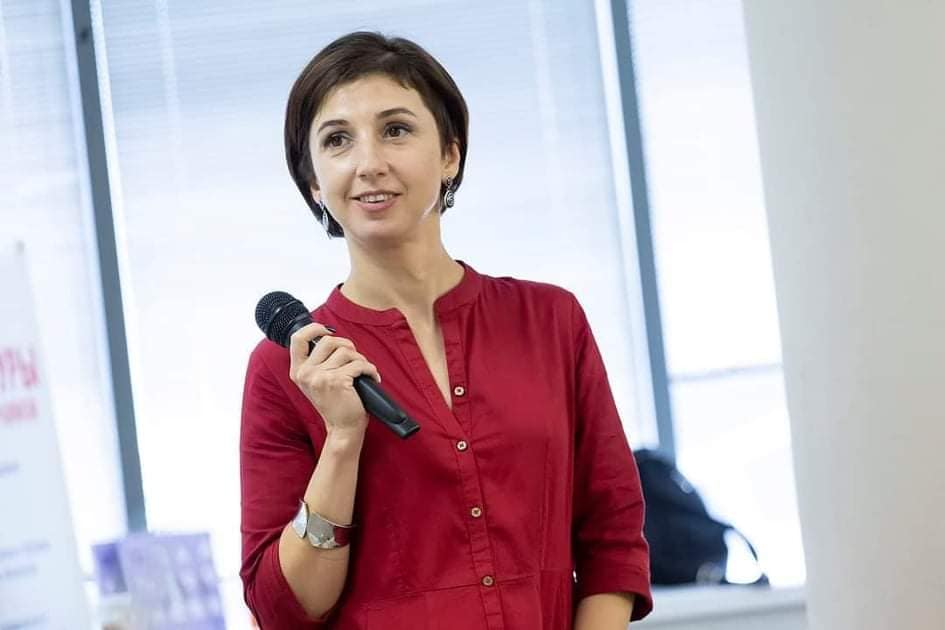Елена Лысых: “От первой встречи с Клиентом зависит, будет ли у нас контракт”
Сегодня у нас в гостях Елена Лысых, которая вот уже 13 лет готовит предпринимателей к самым сложным переговорам. Елена – бизнес-тренер по переговорам, помогает выстроить открытые коммуникации внутри компании и внешние переговоры с клиентами и партнерами. Она основатель клуба переговоров.
– Елена, огромное Вам спасибо что согласились на интервью.
Здравствуйте! Мне хочется, чтобы это интервью действительно было для вас полезно и вы могли бы внести позитивные изменения в свои переговоры и свои отношения с людьми как в бизнесе так и в личной жизни.
– Елена, скажите на Ваш взгляд, можно ли стать успешным предпринимателем не умея вести переговоры? Если нет, то почему.
Это достаточно сложный вопрос потому что я начинаю вспоминать своих клиентов. Действительно, сейчас они построили хороший бизнес, но всегда «хороший» это понятие относительное. Например, предположим, что нашего предпринимателя зовут Максим. Он приходит ко мне на консультацию и одноклассники Максима смотрят на него через десять лет после окончания школы. Максим супер успешный, у него такой бизнес! Но есть кто-то, на кого Максим смотрит с восхищением, ведь он только в начале своего пути, ему еще расти и развиваться много-много.
Всегда тот, кто умеет коммуницировать, тот кто понимает людей, мотивацию людей, умеет грамотно спокойно донести свою мысль, поставить задачи, ему будет проще жить.
Сколько времени мы иногда теряем только потому, что нас неправильно поняли. Например, клиент неправильно понял и подумал что все бесплатно. Точно так по сотрудникам, если вы умеете зажигать своими идеями, то вы привлечете к себе лучших людей, которые приходят к вам на собеседование.
Успешные коммуникации помогают вам выбирать самому, помогают зарабатывать больше и собирать вокруг себя тех людей, которые вам близки.
– Елена мне очень близка эта тема, так как я сама владелец бизнеса, но я считаю, что нет предела совершенству. Даже имея какой-то опыт за плечами, все равно есть куда расти и в переговорах в том числе. В продолжение этой темы хотела сказать, что если мне допустим коммуницировать с украинскими компаниями достаточно просто, потому что возможно менталитет одинаковый, ситуация на рынке одинаковая. Но у нас есть клиенты иностранные. Скажите есть ли какие-то подводные камни в коммуникациях с иностранными клиентами?
Безусловно есть. Это не совсем моя тема, но я могу об этом говорить, т.к. мы уже готовимся к переговорам с моими клиентами к переговорам, например, с американцами. Они привлекают дополнительных экспертов, которые либо сейчас живут в этой стране, либо которые давно вели бизнес с этой страной, потому что здесь масса нюансов. В Израиле люди не привыкли хвалить, будут говорить по делу и будут выбирать для себя лучшие условия. Если вы работаете с американцами, то чаще всего вы столкнулись с культурой, когда вам говорят: «Спасибо, это было круто». Нам так не хватает похвалы в Украине. У одного из моих клиентов был достаточно печальный опыт. Они работали с американцами полгода на проекте и каждый раз когда американец проверял как сделана работа, продукт, им говорили «спасибо, Вы молодцы». Команда была воодушевлена, ее постоянно хвалят! Через полгода американец сказал, «Мы закрываем проект, не будем с вами работать». Когда спросили почему, он сказал, что команда недостаточно профессиональна. Демотивация сотрудников была колоссальная. Руководству пришлось работать над повышением мотивации команды, потому что они чувствовали себя обманутыми. Нас полгода хвалили, говорили, что вы молодцы, а оказывается, это все неправда и мы недостаточно профессиональны. Если бы мы бы мы раньше узнали обратную связь, то что-то сделали бы по-другому. А теперь этой команде достаточно сложно верить клиентам, и они все время находятся в такой атмосфере недоверия уже с другими клиентами.
– Очень интересный кейс. Но вернусь еще к первому Вашему комментарию. Вы говорили про то, что на первоначальном этапе нужно сразу же договариваться. Допустим про какие-то доработки. Я так понимаю, что первая встреча с потенциальным клиентом самая важная? Так это или нет? Может быть можно как-то выделить токсичных клиентов?
Сейчас я буду четко давать советы и рекомендации по первой встрече. Давайте начнем с нее, а потом вернемся к токсичным клиентам, так называемым клиентам-террористам.
Итак, если мы идем на первую встречу, она действительно невероятно важна, потому что от того, какое впечатление мы создадим: атмосферу доверия и интереса в этих переговорах, зависит будут ли у нас деньги, будет ли у нас контракт. И здесь есть несколько важных точек.
Цель первых переговоров создать атмосферу доверия. Мы ее создаем через личный бренд. Потенциальный клиент пропускает Вас через два фильтра: через экспертизу и личность. Интересно ли мне будет с тобой работать? Насколько мне с тобой просто общаться, будет ли нам с тобой о чем-то поговорить помимо нашей работы? И здесь мы направим свое внимание внутрь себя. А что же во мне есть такое из-за чего Клиенты хотят со мной работать? Поищите, спросите у своих знакомых, спросите у коллег, что есть у вас такого, что привлекает к вам их внимание. Что делает общение с вами комфортным? Может быть вы много путешествуете и вы в этом плане интересный собеседник. Может быть вы умеете хорошо слушать. Может быть вы умеете обходить острые углы. У каждого из нас свой магнит. Вот его нужно узнать. И второй фильтр – это экспертиза. Мы всегда проверяем, могу ли я этому человеку доверить свой бизнес, готов ли я платить именно этому человеку за экспертизу? Запишите, пожалуйста, знания и навыки, которыми должен владеть человек, который работает на вашем месте.
Вот если бы завтра в ваш бизнес как руководитель, как собственник пришел какой-то другой человек и если бы этот человек поднял ваш бизнес в два раза за полгода, какие качества у него должны были бы быть? Запишите этот список.
 И еще момент, который подчеркивает вашу экспертизу. Вы описываете не проблемы клиента, а решения, какие риски вы готовы предотвратить или взять на себя. Потому что чаще всего мы начинаем рассказывать про то, что мы делаем. Мы для вас делаем сайт, маркетинговые программы продвижения. Но какие проблемы клиента мы решаем? Естественно надо изучать клиента и его бизнес.
И еще момент, который подчеркивает вашу экспертизу. Вы описываете не проблемы клиента, а решения, какие риски вы готовы предотвратить или взять на себя. Потому что чаще всего мы начинаем рассказывать про то, что мы делаем. Мы для вас делаем сайт, маркетинговые программы продвижения. Но какие проблемы клиента мы решаем? Естественно надо изучать клиента и его бизнес.
Возьмем сферу недвижимости, что вы знаете про рынок недвижимости? Вы клиенту будете говорить: «Смотрите, мы видим что на рынке недвижимости аренды жилья очень большая конкуренция и цены в кризис упали. Поэтому мы с вами построим такую программу вашего продвижения в интернете, что вы сможете продавать дороже чем другие. Или к вам будут приходить клиенты, которые готовы взять аренду на долгосрочный период. И вы уже рассказали про проблематику.
По поводу рисков. Что вы будете делать, если что-то пойдет не так? Привлечете какого-то специалиста? Вернете деньги? Когда вы знаете ответы на эти вопросы, это показатель вашей экспертизы. Тогда клиенты выбирают вас потому, что вы человек приятный и как эксперту вам можно доверять. Это выделяет нас от конкурентов, ведь сейчас главное конкурентное преимущество – это вы сами.
Еще пара моментов по поводу первой встречи. Что еще надо знать когда вы идете на первую встречу и подготовке сотрудников, которые ходят на первые встречи с клиентом. У Вас должен быть чек-лист, в котором написано:
- о чем надо у клиента спросить,
- что клиенту надо сказать.
Его нужно брать обязательно на каждую встречу.
Про что спросить. Например, вы должны задать вопросы, которые вам помогут узнать клиента больше. К примеру, почему вы выбрали нас. Почему вы решили делать проект именно сейчас. Надо задавать вопросы по бюджету. Скажите, как часто вы можете менять бюджет. На сколько он может быть гибким? Нам надо согласовать его сейчас, учитывая, что он может быть расширен или заложить немножко больше, потому что у этой компании согласование по бюджету проходит раз в полгода. На сколько критичны сроки и что будет если сроки придется немного продлить? На сколько мы можем их продлить? Кто в компании принимает решение? Кто будет принимать проект: вы или кто то еще? Кто будет пользователем продукта? И тогда вы понимаете с кем вам надо будет впоследствии еще договариваться. Ищем те вопросы, которые критичны для вашего бизнеса.
И второе то, что надо сказать. Например, как проходит оплата? Работаем по предоплате о и том, что изменения вносятся платно или бесплатно.
Расскажите, какие первые шаги вы сделаете, как вы будете связываться, как быстро вы ждете обратную связь и многое другое что связано с этим.
Поэтому вот эти два списка вопросов, которые помогут вам быть спокойными на первой встрече и избежать того, что вам придется перезвонить и говорить, «А вот я еще вам забыл сказать».
– Елена, я бы хотела перейти к теме токсичных клиентов. Скажите, считаете ли вы правильным утверждение, что «не каждый клиент наш клиент»?
Согласна на 100%. Во-первых, смотрите, есть такое понятие, клиент-террорист. Это когда клиент начинает придираться, звонить, конфликтовать, требовать больше. И это настолько вредит бизнесу, что сотрудники не хотят с ним общаться и собственник уже не думает про компанию. Он ложится спать думаю про этого клиента и с переживаниями, что завтра будет.
Эта проблема настолько актуальна, что мы даже создали специальный онлайн-курс, где мы прорабатываем все этапы: как понять первым в разговоре, что клиент – террорист. И здесь два момента. Есть люди такие, а есть то, что мы своими отношениями создаем вот таких людей.
Что касается темы, что не все клиенты мои. Сейчас уже эта тенденция есть и я уверена, что в ближайшие 5 лет мы увидим как меняется кардинально рынок фокуса на то что не клиенты выбирают компанию, а компании выбирают клиента.
Ко мне приходят на консультацию и говорят: «Нам звонят клиенты, которые нам не нравятся уже при первом знакомстве, потому что начинают говорить что-то в роде «так, короче, я сказал вам в 11 собираемся, заберите там всех своих, я вам расскажу как работать со мной». Мы не хотим работать с таким клиентом. И когда мы ему отказываем, он начинает звонить с другого телефона, начинает писать негативные комментарии, а мы понимаем, что если мы начинаем с ним работать, то это будет проблема для всех!
Как нам грамотно отказывать клиенту, чтобы не вызвать агрессию и чтобы он понял, что ему лучше работать с кем-то другим? Как отказать, если вы видите, что клиент не ваш потому что вам сложно общаться, потому что он чрезмерно требователен. Задайте вопросы: работал ли он раньше с подобным бизнесом; заказывал ли такую услугу; как он относится к результату сейчас. Послушайте ответы: «ребята ничего не делают; они вообще меня обманули». Значит к вам будет такое же отношение. Кроме того, что у нас есть интуиция, нам что-то нравится или не нравится, проверяйте своих клиентов.
Если вам надо отказать, вы можете сказать: «Смотрите, мы видим, что вам очень важно чтобы вы могли в любой момент позвонить и получить обратную связь. Поставить задачу, чтобы задача выполнялась срочно и быстро. К сожалению, в нашей компании это не получится. Ребята работают с девяти до шести. Вы не сможете получить ответ после того времени. С нами работают несколько клиентов, поэтому время будет распределено согласно приоритетам. Рекомендую вам воспользоваться услугами другой компании. Вам это будет более комфортно. Таким образом вы подчеркнули, что вы клиента понимаете.
– Елена, могли бы Вы рассказать немножко про вашу идею клуба переговоров. Рассказали в период карантина как вы работаете с клиентами. Было бы хорошо, чтобы вы рассказали для всех немножко больше именно про вашу компанию, про клуб, про ваши услуги.
Спасибо за этот вопрос, я с удовольствием поделюсь. Клуб переговоров у нас работает в режиме онлайн и мы очень рады, что за это время мы выработали именно ту систему, которая помогает сделать практику гораздо больше, чем давали раньше в офлайн. Этот клуб создан именно для людей, которые работают с клиентами, для которых есть свой бизнес, кто постоянно взаимодействует в этом бизнесе с партнерами, с клиентами и сотрудниками. Обучаются там раз в неделю, разыгрываем кейсы и получаем обратную связь. Вы смотрите как в одной и той же ситуации разные люди ведут себя по разному и добиваются разных результатов. Например, сегодня у нас будет занятия в клубе посвящённое работе в мегаполисе. Что делать если клиент вечно жалуется, что делать, если сотрудника, который показывает хорошие результаты, недолюбливает команда и т.д. Мы будем разбирать эти ситуации. Участники уже получили видео урок, в котором они взяли все теоретические моменты по этому поводу. Завтра они разыграют сценку, где будет один негатив, а задача второго сделать из этого позитив и добиться лучших результатов.
Клуб переговоров помогает вам выстроить новую переговорную стратегию, новые навыки, установить контакт, привлечь к себе, показать выгоду своего предложения, развить умение разговаривать с клиентом так, чтоб он не чувствовал, что ему продают услугу, чтоб он чувствовал забота о нем. Он готов за это платить дорого. Это переговорный навык.
– Елена огромное вам спасибо за уделенное время и интервью
Я всегда рада поговорить о том, что действительно может быть полезным для бизнеса, потому что на мой взгляд все то, что мы делаем в Украине сейчас, те, кто взяли на себя ответственность, риски и желание строить что-то свое, действительно меняет страну. Поэтому мы с удовольствием вас поддержим, поможем сделать наш бизнес комфортным, более прибыльным за счет тог,о что мы построим новые коммуникации с новыми людьми. Хорошего дня.
Больше информации по переговорам, видео, статей и ответов на профессиональной странице http://www.facebook.com/klubperegovorov/
В телеграмм канале вы можете читать короткие рекомендации и переговорные кейсы – https://t.me/peregovor_spargalka
Если вы хотите прийти на пробное занятие в онлайн клуб переговоров, потренироваться и получить рекомендации пишите clubperegovorov@gmail.com или звоните: 0990968424 или 0686403112
Эксперт в области интернет-маркетинга. Руководитель маркетингового агентства MAVR.
Бизнес-степень «Мастер делового администрирования» (MBA).



